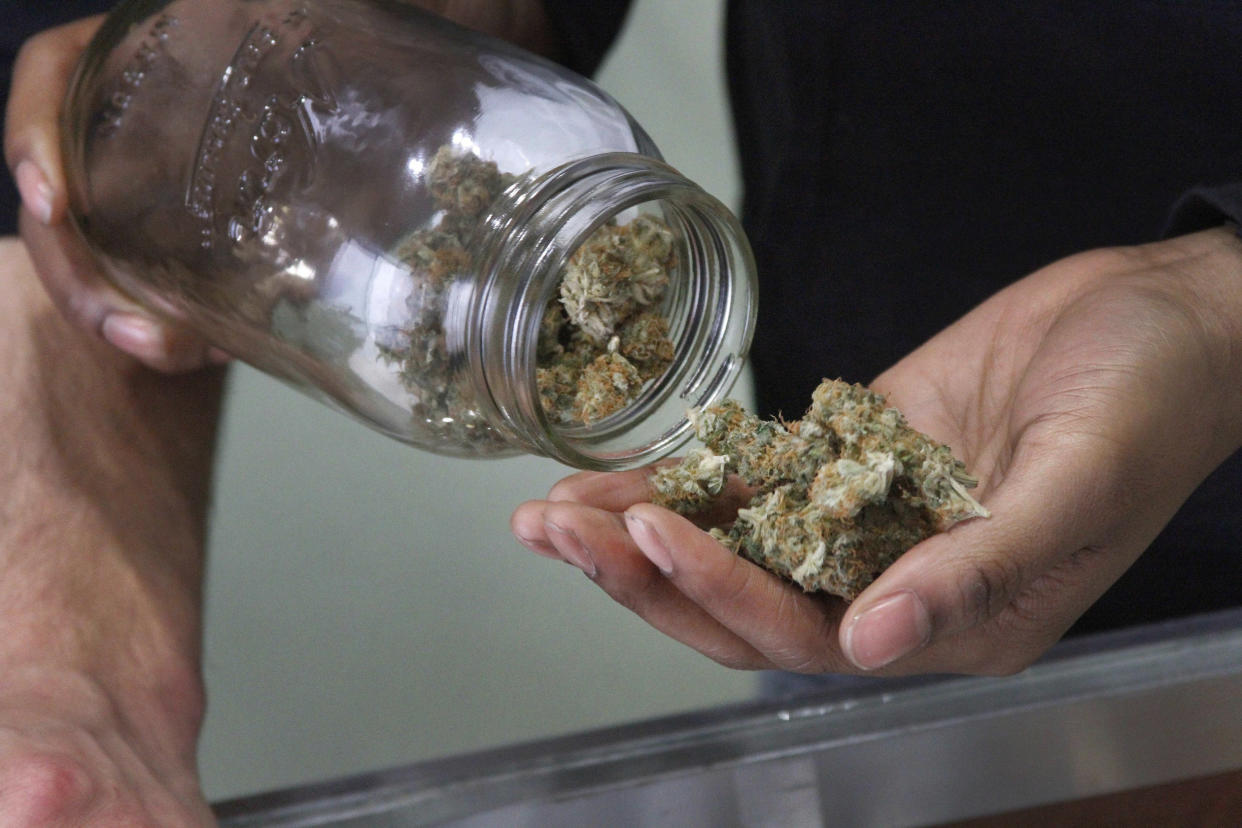Weed CFO: The IRS tax code is 'crippling' and 'devastating' for us

Cannabis companies are facing another tax year bogged down by IRS limitations that designate them as drug traffickers and single them out for special treatment.
“It's crippling to businesses,” Michael Raisch, CFO of Colorado-based LivWell Enlightened Health, told Yahoo Finance. “It really doesn't allow for the sustainability of these businesses. It's really that onerous. It's just devastating.”
Raisch said LivWell had been audited by the IRS four years in a row, yet audits are far less of a concern than the tax code’s 208(e) limitation that prevents cannabis businesses from filing like the majority of American companies. Added to frustration are banking restrictions that leave no choice for many cannabis business but to pay Uncle Sam in cash.
“The struggle that cannabis businesses face is that because marijuana is still a Schedule I drug it’s subject to Internal Revenue Code 280(e),” said Dani Espinda, a Washington state CPA who advises cannabis companies. “Marijuana businesses are considered to be trafficking in a Schedule I drug, and as long as they're ‘trafficking’ they cannot take their ordinary and necessary business deductions.”
Rule 208(e) applies to plant-touching businesses — those that grow, process, handle and sell cannabis-containing products — as opposed to companies that manufacture and sell peripheral products like processing equipment, vape pens, and other paraphernalia.

Specifically, the rule states that no deductions are allowed for any amount paid or incurred in carrying on any trade or business, if the trade or business consists of trafficking in controlled substances.
“The only solution to the 280(e) conundrum is to change the law,” Raisch said.
Cannabis companies and their lobbies are trying to do just that. A renewed push for Congress to adopt the “STATES Act” — Strengthening the Tenth Amendment Through Entrusting States Act — was reintroduced Thursday and has bipartisan support from Republicans and Democrats.
“Essentially it says if you're in a state where cannabis is a legal substance, and it's a regulated industry, and you are a company that is in good standing with the regulators, then for you in that state it's not a violation of the Controlled substance Act,” Raisch explained.
‘A world of tax issues’
Under the tax code, cannabis businesses are permitted to deduct costs associated with producing their products, though that’s where the typical businesses advantages end.
That leaves retailers and integrated businesses (those that are involved in multiple steps in the supply and distribution chain) at a disadvantage, compared with growers, Raisch said.
“If you are an integrated company like we are, or if you are a retail company ... you have a whole bunch of other costs that are not deductible. For example, the rent for my store, the labor for the people who work for me, the cost of their insurance benefits, the 401(K) benefit that I match for those people, none of that's deductible,” Reich explained, adding that accounting and marketing costs are also off limits.
“Everything you can think of that’s outside production and manufacturing costs would not be deductible under the IRS’s interpretation of 280(e),” Reich said.
Kyle Sherman, founder and CEO of Flowhub, creates point-of-sale software for cannabis dispensaries.
“From a tax perspective there isn’t too much discrimination for us as a tech company,” Sherman said. “Our customers are plant-touching and the folks who are plant-touching have a world of tax issues. The essence of the American dream is essentially ruined for them because of 280(e) — they find their margins are compressed significantly.”
Could weed businesses benefit from Trump’s tax law?
According to Espinada, despite 280(e), the tax code does leave some room for pass-through filers to take advantage of cannabis-related deductions, though she cautions not all tax practitioners agree. Business owners of pass-through entities account for business taxes on their individual returns, rather than on business returns.
“For the ones that filed as pass-throughs, this is where it gets sticky,” Espinada said, explaining that practitioners are divided over the issue. “There’s been a bifurcation in how people are filing.”

Under the Tax Cuts and Jobs Act, signed into law in December 2017 by President Donald Trump, “QBID” or Qualified Business Income Deductions, became effective for the first time in the 2018 tax year. With some limitations, the new rule allows pass-through filers to take a deduction equal to 20% of “qualified business income” earned from the relevant business.
Generally, the deduction is available to individual filers who report income from sole proprietorships on Schedule C, shareholders in S corporations, and members in partnerships, including LLCs.
The bifurcation, Espinda said, is based on how practitioners interpret QBID.
“On one side of the camp, because it's deemed a deduction, many practitioners are saying 280(e) simply states that there's no deduction and or credit allowed,” she said. “Then you get people on the other side of the camp that say, well this isn't a deduction in the business, this is a deduction on the individual return.”
“We believe that this is okay,” Espinda said. “Where I think it may be risky taking this deduction on the individual return is because it remains to be seen whether or not the IRS will take a look at the origin of that income and deem it to be trafficking.”
In response to Yahoo Finance’s question asking whether Section 208(e) will prevent pass-through filers from deducting cannabis business-related expenses, the IRS declined to comment. Asked about its position on whether corporate and individual tax filers may deduct investment losses for stock purchases in cannabis industry companies, a spokesman for the IRS told Yahoo Finance that the Department was checking into the issue and would respond back if it found any information.
“There’s really no clear guidance on what to do with that,” Espinda said about investors in cannabis companies. “So we've been treating that capital gain as a regular capital gain or loss.”
Espinda said she’s explaining the current risks to her clients and advising those who take a pass-through deduction to account for a future tax liability should the IRS rule that cannabis-related deductions are not permitted.
“We're not obviously able to take losses at the business level on because of 280(e), but for an investor ... when they have sold their stock or membership interest, we’re not putting any limitations on those capital losses, or gains.”
Raisch said that Congress’s adoption of the STATES Act would mean more opportunities for cannabis companies to participate in the American economy and more opportunities for those businesses to create jobs.
Alexis Keenan is a former litigation attorney and previously produced live news for CNN. Follow Alexis on Twitter at @alexiskweed.
More from Alexis:
Facebook faces ‘potentially dramatic consequences’ after HUD lawsuit
Stormy Daniels’s lawyer could face uphill battle in Nike extortion case
Boeing could face ‘absolutely devastating’ economic impact after crash
